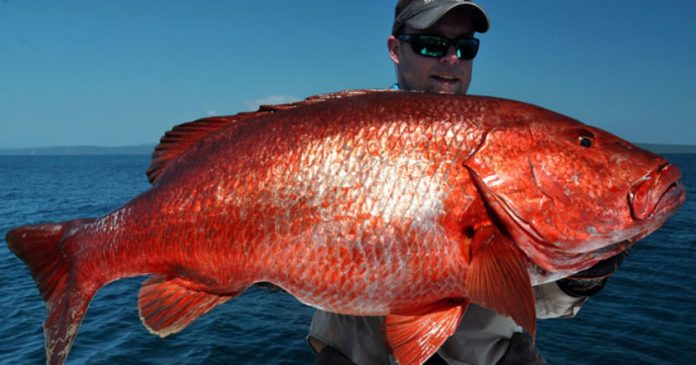U.S. Commerce Department officials may well have deliberately violated federal fisheries law this June when they extended the Gulf of Mexico’s red snapper season, according to department memos.
A House panel voted this week to provide Gulf of Mexico states more power to manage the popular red snapper, but questions are being raised on the move.
Memos show that Commerce Secretary Wilbur Ross along with an adviser may have violated federal fisheries law when they decided to extend the Gulf red snapper season in the hopes that it would force the Congress to act.
Earl Comstock, the Commerce Department’s director of policy and strategic planning, informed Ross that a longer season may cause “overfishing” by nearly 40 percent and may result in a lawsuit.
But he nonetheless urged Ross to go ahead, saying it may force the Congress to liberalize the law and grant more autonomy to Gulf states on the issue. A follow-up memo from him stated that both White House and around a dozen congressmen from the Gulf states had asked Ross to see if a longer fishing season was possible.
Ross decided the next week, to extend the season from three days to 42, causing celebrations amongst recreational anglers in the Gulf states of Texas, Florida, Mississippi Louisiana, and Alabama .
Memos Show Deliberate Attempt To Violate Fishery Law
Critics however say that the memos are proof that NOAA Fisheries and Commerce had deliberately bypassed the Magnuson-Stevens Fishery Conservation and Management Act, which sets quotas to rebuild overfished stocks, such as the red snapper.
The memos were made public in a response filed by Commerce in regards to a lawsuit initiated by Ocean Conservancy a nonprofit environmental group and the Environmental Defense Fund in U.S. District Court in Washington, alleging mismanagement by the involved agencies
Charles Witek, a recreational fisherman from New York called the decision to extend the season “a patently illegal action” and noted that the administration had placed “short-term economic gains over the long-term health of fish stocks, with really no regards for the science.”
Justice Department attorneys asked the court to dismiss the case, saying that the claims in the lawsuit are “moot” since the 2017 season was already expired and there were no plans for similar lengthening in 2018.
High Degree Of Political Pressure
The political battle surrounding the red snapper will continue even after judgement is received on the case.
Critics are particularly worried about a two-year federal study program with a budget of $12 million that aims to estimate the number of red snappers in the Gulf.
Twenty-one scientists led by Greg Stunz, a professor at the Harte Research Institute for Gulf of Mexico Studies at Texas A&M University, Corpus Christi are slated to shortly begin the study with the aid of scuba divers and underwater cameras.
Stunz said that the red snapper fishery was the “the most contentiously managed fishery in the world.”. He acknowledged that even NOAA might accept that their population was not as much as desired.
According to Stunz the study will not seek to “disprove or prove or refute the NOAA assessment” but will try to bolster it with “new and improved data.”
However critics are worried about the independence of the study.
Political Considerations May Affect Federal Study
Meredith Moore, director of Ocean Conservancy’s fish conservation program, expressed worries if “political pressure will continue to override science-based fishery management decisions.”
Witek also expressed concern that Stunz may not be qualified to lead an independent study due to his ties with the sportfishing industry.
Stunz is the endowed chair for fisheries and ocean health and director for the Center for Sportfish Science and Conservation at the Harte Research Institute. The center had started with a $500,000 donation from the Coastal Conservation Association, a group that supports changes to the federal fishing law.
According to Witek, NOAA scientists, are the best-equipped to lead a neutral study since they are government scientists. He believes it very unlikely that these 21 scientists would report lesser number of red snapper than NOAA Fisheries estimates.
He has particularly expressed worries regarding the methodology that may be adopted by the team, questioning whether it would be “a statistically valid survey or are they going to pick out areas where they know there are going to be more fish.”
Stunz called the scientists involved in the project as “the best of the best.”
Rules Changes Part Of Trump Administration’s Push For Deregulation
NOAA’s management of the red snapper population has been attacked by both Democrats and Republicans in the congress.
House Natural Resources Committee ranking member Raúl Grijalva (D-Ariz.) noted that Commerce had acted without “scientific justification” and pointed out that the department had admitted that its plan may result in delaying the rebuilding of the red snapper stock by almost six years.
In a report to Congress Peggy Gustafson, the new Commerce Inspector General has said that NOAA Fisheries “continues to face challenges to ensuring timely and accurate assessments” of its stocks, calling it “the top management and performance challenge” faced the agency.
When Ross extended the season this year, he informed a Senate subcommittee that fishermen “are frustrated” due to shorter fishing seasons and that he had shared President Trump’s “commitment to cutting unnecessary red tape and eliminating failed regulations,”
The House Natural Resources Committee voted last week review the Magnuson-Stevens Act for the first time since 2006 . Chairman Rob Bishop (R-Utah) noted that fishery management decision in the country had become “notably worse” in the last 10 years, resulting a high number of restrictions on fishermen .
The panel also passed the “The RED SNAPPER Act” — the “Regionally Empowered Decision-making for Snapper, Noting the Angling Public and the Preservation of an Exceptional Resource Act” of 2017, a bill introduced by Republican Rep. Garret Graves of Louisiana which gives states “more autonomy” in handling the red snapper, by granting them powers to set up seasons 25 miles into the Gulf of Mexico.



